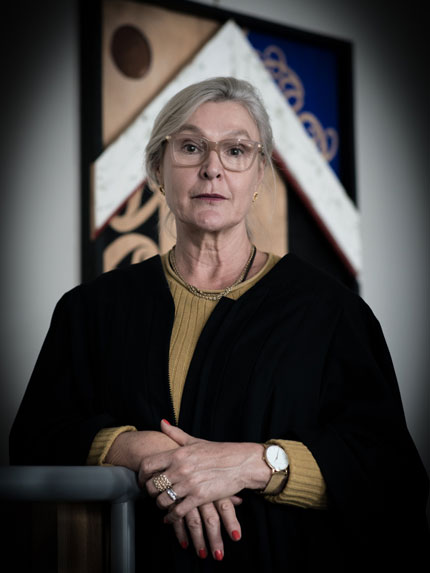Judge Ema Aitken, The Alcohol and Other Drug Treatment Court

It costs around $100,000 a year to house just one prison inmate; that’s more than $270 a day.
Auckland District Court judge, Ema Aitken, believes New Zealand’s current justice system must change.
“It’s time to be honest about the cost of the status quo,” she says.
So, she’s doing something about it.
Along with West Auckland’s Waitakere District Court judge, Lisa Tremewan, Judge Aitken has established The Alcohol and Other Drug Treatment Court pilot. The pair is making it their mission to introduce a better system of rehabilitation for drug and alcohol addicts awaiting a prison sentence.
Judge Aitken knows firsthand that the current system is failing with a lot of New Zealand's offenders. When she looks into the eyes of a convicted person, she sees a soul who is “sick and tired of being sick and tired.”
It’s a phrase Judge Aitken has coined after witnessing the look of desperation countless times throughout the years she’s worked in New Zealand courts, sentencing people for crimes relating to drug and alcohol abuse.
“The tools I have as a sentencing judge aren’t always appropriate and it doesn’t take long before I see the same people circling through the system,” she says.
“It’s depressing seeing people go round and round; it certainly doesn’t reduce crime. I often have people tell me, ‘I’m sick of my life, I just don’t know how to change it.’”
Judge Aitken doesn’t deny there’s a place for prison, but it needs to be a last resort, she says, with the focus on holding people accountable for their behaviour and on reducing offending. The five-year pilot is in its final year and while it’s still too early to say whether it will be a fixed feature in our justice system, Judge Aitken says the numbers show it’s proving effective.
“We have saved literally millions of dollars in prison costs and there are many benefits, including the reduction of reoffending. Participants are offending less often and less seriously, so it has a positive effect on the wider community as well,” she says. “We know where the gaps are and we’ve joined the dots.”
It’s a three-phase, 18-month-long programme designed for high-needs and high-risk addicts who are facing prison, or who have tried but failed treatment programmes in the past.
So far the court’s had 110 graduates. To graduate, offenders must have been drug and alcohol free for 18 months and be employed or enrolled in study.
“They go from being a drain on the tax payer to being a tax payer,” Judge Aitken says.
The first phase of court sees participants enter a local alcohol or drug treatment programme for up to six months, completely abstaining from their chosen poison. The next steps involve tailored one-on-one courses like anger management as well as volunteer work.
“Part of the recovery process is cleaning up what they’ve messed up. We’ve contributed 20,000 hours of volunteer work over the pilot’s five years,” Judge Aitken says.
“It’s rewarding for them to give back to a community, and it’s in places which are going to enhance their recovery, such as the Salvation Army.”
The ‘therapeutic model’ used in the courtroom means that the focus is on specific behaviour; it’s not a personal attack on the offender up for sentencing.
“I use practices and procedures to enhance wellness and maintain a person’s dignity,” Judge Aitken explains. “They see the support and respect and start to feel valued. We hold hope for them. It’s the first time for a lot of them that someone’s cared.”
Judges Aitken and Tremewan have tailored New Zealand’s pilot so it offers peer support, often from former addicts who themselves have had run-ins with
the law. There’s also a pou oranga, a cultural advisor, whose role is to impact Maori in a positive way; court begins with a waiata and karakia: song and prayer.
“We are transforming lives. It doesn’t happen overnight and we don’t expect to be miracle workers, but I’m constantly humbled by the effort and determination our participants put into their recovery,” Judge Aitken says. “What we see in court is a transformation on every level.”
General Manager of AA Motoring Affairs, Mike Noon, says the AA is fully supportive of the programme.
“The AA’s focus on keeping drunk and drugged drivers off our roads has led us to closely follow Judge Aitken’s work with the Alcohol and Other Drug Treatment Court pilot.
We have seen serial, repeat drink-drivers successfully stop offending and turn their lives around through the programme,” Mike says. “The AA wants to see these courts expanded through the country, because they work.”
Reported by Monica Tischler for our AA Directions winter 2017 issue
